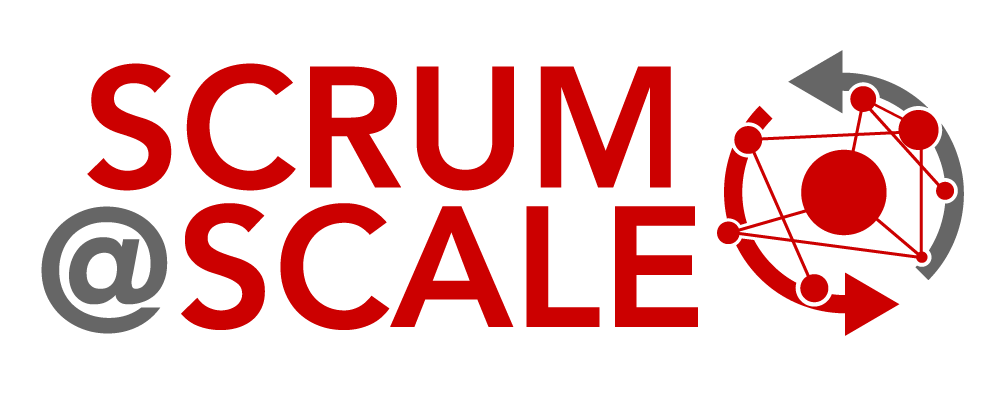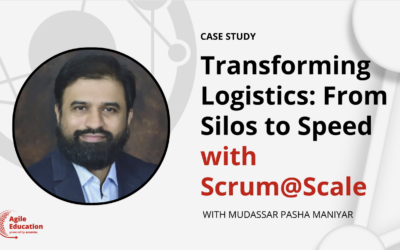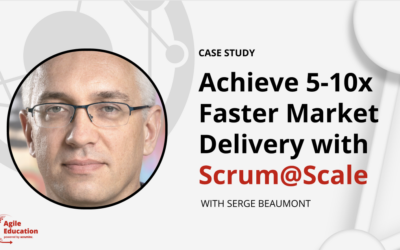Agile Education Case Study
A Data-Led Approach to Scaling Scrum Globally at Sanofi
How do you align 50+ global teams to deliver faster, smarter, and at scale?
Sanofi’s mRNA Center of Excellence turned to a data-led Agile maturity framework to replace subjective progress with clarity, speed, and measurable impact. Explore how structured Scrum practices fueled vaccine innovation across a $7B portfolio.
CASE STUDY SNAPSHOT
Trainer Name: Robert Schrader
Industry: Healthcare
Organization Size: Large
Topic: Scaling Scrum Globally
Date: 2025
LinkedIn: https://www.linkedin.com/in/robert-schrader-b1b5a53/
Case Study Summary
Discover how Sanofi’s mRNA Center of Excellence (mRNA CoE) within Vaccine R&D Business Unit, leveraged data-driven Agile maturity assessments to accelerate the transformation of over 50 platform teams across global hubs in the United States, France, and Australia. Through a systematic approach using the Scrum framework, the mRNA CoE is seeking to move away from scattered progress and subjective evaluations to achieving faster delivery of critical vaccines candidates, with clarity, precision, and organizational alignment across a growing $7B vaccine portfolio.
Sanofi’s mRNA Center of Excellence (mRNA CoE), with over 500 team members globally and a 20% increase in new hires in less than a year’s time, needed a scalable way to manage its Agile transformation within its mRNA Center of Excellence. Despite broad adoption, transformation efforts lacked consistency, visibility, and actionable insights. With over 50 teams in play, leaders found it difficult to assess readiness, communicate successes, or identify gaps. Conversations about team progress were often subjective and misaligned with actual performance.
To address this, the mRNA CoE developed a Scrum Maturity Evaluator Application to evaluate team practices in roles, events, artifacts, and metrics. This allowed for an aggregated view of engagement, readiness, and specific improvement areas, helping leadership have more informed and objective conversations with teams.
The Solution: Framework-Driven Data Meets Leadership-Backed Change
By grounding their transformation in real data, the mRNA CoE was able to move beyond anecdotal reporting. Teams were evaluated using a granular maturity model that highlighted strengths and development areas across Scrum roles, events, and artifacts. Dashboards made macro-level trends visible, enabling managers and leaders to support teams based on real-time insights.
Visualizations were key to rallying executive and managerial support. The ability to show progress over time and spotlight key growth areas reduced waste, enabled faster decision-making, and cultivated a culture of continuous learning.
Recognizing the success of this method, the mRNA CoE is now developing a Version 2 of their maturity scale. The aim: to provide more precise, role-specific guidance and smarter prioritization based on real-world patterns from extensive data.
Outcomes from Implementing the Agile Maturity Framework
The mRNA CoE’s data-led maturity evaluation process delivered several tangible benefits:
- A unified and objective view of team maturity across 50+ teams
- Clear, data-informed conversations between coaches, managers, and executives
- Reduced waste by identifying unproductive practices and aligning coaching to specific needs
- Transparency that engaged leaders and managers in supporting the transformation
- Accelerated team development with targeted recommendations and evolving best practices
- Designing a V2 maturity model to improve specificity and impact of future coaching
About Robert Schrader
Robert Schrader is Registered Scrum Trainer™ and Agile Office Lead at Sanofi’s mRNA Center of Excellence. He leads the deployment of agile ways of working across global teams to drive performance, operational excellence, and integration within the mRNA ecosystem. With a background that includes being a bench scientist, functional planner, global project manager, and organizational transformation lead, Bob brings deep experience in aligning strategy, resources, and execution. His leadership has supported cross-functional initiatives, large-scale site reorganizations, and early research portfolios, making him a pivotal force in guiding Sanofi’s agile journey.



